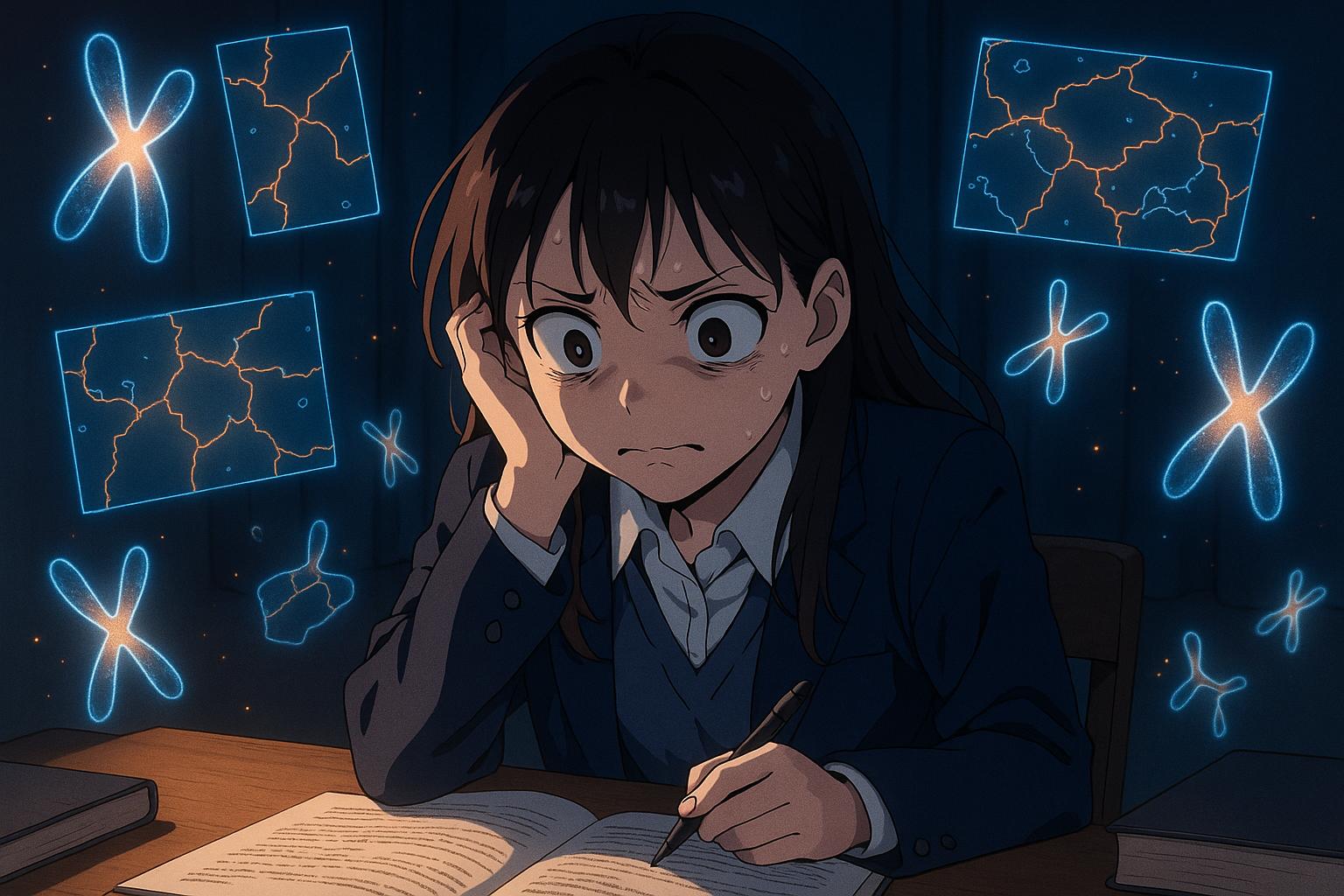As exam-related anxiety soars in UK schools, activists and experts from Young Minds urge an overhaul of traditional testing methods, highlighting the devastating mental health impact on students like Chloe and advocating diverse, less pressurised assessments.
Every morning, I’d wake up to the same sight: felt-tip drawings of chromosomes on white A4 paper. My home was adorned with maps of tectonic plates and layers of volcanoes, each scribble and chart a testament to my attempts to tackle the intense pressure of exams during my GCSE year. In 2019, this not-so-ordinary scene was a daily ritual as I prepared for 26 exams over a mere three weeks. The relentless cycle of “exam, cram, exam, cram” transformed my living spaces into reminders of academic stress.
Chloe, a 22-year-old activist with Young Minds, captures a shared experience that has only intensified in recent years. A recent survey from the Association of School and College Leaders highlighted that more than three-quarters of teachers noted mental health issues linked to exam anxiety among students in the 2023-2024 academic year. This concern has been echoed in findings from Childline, which reported a staggering 10% increase in counselling sessions for children grappling with exam-related stress compared to previous years. This uptick is particularly alarming given the backdrop of disrupted education due to the COVID-19 pandemic, which has left many students feeling unprepared and overwhelmed.
In light of these findings, Young Minds has called for a comprehensive reform of the current examination system, advocating for the abolishment of SATs, which impose stress on children as young as ten. Their proposal suggests diversifying assessment methods for GCSEs and A Levels, favouring portfolios, project work, and presentations over traditional exams. This call for change resonates deeply with Chloe, who believes that the intense scrutiny of exams exacerbated her own struggles with anxiety and depression.
Reflecting on her experiences, she recounts a particular geography mock exam that was nearly ruined by a panic attack, where she achieved just 20%. Fortunately, with supportive educators helping her make necessary arrangements, she overcame immediate challenges. However, the burden of expectation loomed large, as she was repeatedly reminded of the significance of her GCSEs in securing her future.
In a world glorifying “StudyTok”—where students share their perfect notes and meticulous revision schedules—Chloe initially felt inspired. Yet, this app fostered a sense of inadequacy in her, amplifying the isolation felt among peers equally burdened by academic demands. As mutual stress replaced social connections, library gatherings morphed into silent, anxious study marathons.
Despite her successes in achieving all 9 to 7s (the former A* to A), the culmination of pressure led her into even more challenging conditions when she transitioned to sixth form. Working up to 20 hours a week while trying to study positioned her at a disadvantage against peers from more affluent backgrounds. A report from the Higher Education Policy Institute revealed that a record 56% of students now engage in part-time work while studying, which contributes to a widening educational gap. Many of these students, like Chloe, report that their work commitments negatively affect their studies.
This systemic pressure culminated in Chloe experiencing “ambition burnout” by the time she reached university in 2021, leading her from being a high-achieving student to struggling significantly, even receiving a zero in exams. The path to recovery necessitated a change in universities and a conscious decision to avoid high-pressure assessments, ultimately enabling her to earn her degree in politics. Now pursuing a master’s at Cambridge University, she continues to reflect on the enduring pressure faced by today’s youth.
Calls for systemic reform are gaining traction, with various reports proposing investments in mental health initiatives and spreading exams over extended periods. Yet, Chloe supports Young Minds’ recommendation that a fundamental overhaul of the assessment system is necessary. She argues that these traditional exams fail to truly reflect students’ intelligence, particularly for those who may be neurodivergent or struggling with mental health issues.
The immense pressure associated with exams, especially during pivotal adolescent years, raises critical questions about the effectiveness and relevance of the current educational framework. Chloe passionately concludes that no student should have to navigate the chaos of adolescence under the added weight of securing their future through one-off exams in a cold sports hall. Those seeking to support reform can engage with Young Minds’ campaign online, advocating for a healthier future for all young learners.
While the challenges of exam stress are profound, expert advice on managing anxiety during this period can provide critical support. Stevie Goulding, interim head of services at Young Minds, suggests that students find revision methods tailored to their individual needs, include regular breaks, and engage in hobbies outside of study to maintain balance. It is essential for students to have support from friends and family, and to seek professional help if anxiety impacts their daily lives.
 Reference Map:
Reference Map:
Source: Noah Wire Services
- https://www.womenshealthmag.com/uk/health/a64825915/exam-mental-health/ – Please view link – unable to able to access data
- https://www.ascl.org.uk/GCSEsurvey – A survey by the Association of School and College Leaders (ASCL) revealed that over 75% of teachers and school leaders observed mental health issues related to exam anxiety among Year 11 students during the 2023-2024 academic year. The survey also highlighted that 74% of respondents reported the necessity for alternative arrangements due to exam anxiety, and 47% noted students arriving or leaving the exam hall in distress. These findings underscore the significant impact of the current GCSE system on students’ mental health.
- https://www.nspcc.org.uk/about-us/news-opinion/2023/10-increase-in-counselling-sessions-about-exam-stress-since-the-pandemic/ – The NSPCC reported a 10% increase in counselling sessions concerning exam stress since the COVID-19 pandemic. In the 2022-2023 period, Childline delivered nearly 2,000 counselling sessions on this topic, with 44% occurring in April, May, and June, coinciding with the exam period. Many students expressed concerns about disrupted learning during the pandemic affecting their performance and coping abilities. The NSPCC advises children and parents to engage in non-revision activities to support mental health during this stressful time.
- https://www.bbc.co.uk/news/uk-scotland-39887096 – A BBC News report highlighted a significant rise in children contacting the NSPCC’s Childline service over exam stress in Scotland. Counselling sessions for girls increased from 53 in 2015-16 to 108 in 2016-17, and for boys from five to 20 in the same period. UK-wide, Childline provided 3,135 counselling sessions on exam stress in 2016-17, marking an 11% rise over two years. Many young people reported that exam stress contributed to depression, anxiety, panic attacks, and suicidal thoughts.
- https://www.tes.com/magazine/news/secondary/concern-over-gcse-exam-impact-on-students-mental-health – An article from Tes magazine discussed concerns among school leaders regarding the impact of GCSE exams on student mental health. A survey revealed that 77% of teachers and school leaders observed mental health issues related to exam anxiety among Year 11 students. The survey also found that 74% of respondents reported the need for alternative arrangements due to exam anxiety, and 47% noted students arriving or leaving the exam hall in distress. These findings highlight the detrimental effects of the current GCSE system on students’ well-being.
- https://www.firstresponsetraining.com/10-increase-in-children-struggling-with-exam-stress/ – First Response Training reported that Childline has seen a 10% increase in counselling sessions about exam stress since the COVID-19 pandemic. In the 2022-2023 period, nearly 2,000 children contacted Childline regarding exam stress, with 44% of these sessions taking place in April, May, and June, coinciding with the exam period. Many students expressed concerns about the impact of disrupted learning during the pandemic on their performance and ability to cope with exam stress.
- https://www.the-independent.com/news/uk/childline-children-gcses-alevels-nspcc-b2078866.html – An article from The Independent reported that the number of counselling sessions over exam anxiety led by Childline has almost doubled in seven months. In 2021-22, Childline practitioners delivered 1,734 counselling sessions to pupils worried about exam stress and revision, a 62% rise on the previous year. Over 200 of these sessions occurred in March 2022, nearly double the number delivered seven months earlier in September 2021, reflecting increasing levels of anxiety as exams approached.
Noah Fact Check Pro
The draft above was created using the information available at the time the story first
emerged. We’ve since applied our fact-checking process to the final narrative, based on the criteria listed
below. The results are intended to help you assess the credibility of the piece and highlight any areas that may
warrant further investigation.
Freshness check
Score:
8
Notes:
The narrative presents a personal account of exam-related stress, which appears original. The inclusion of recent statistics from the Association of School and College Leaders (ASCL) survey conducted in June 2024 and reports from Childline in 2023 adds freshness. However, similar themes have been reported in previous years, such as the 2022 survey by ASCL highlighting increased exam anxiety post-pandemic. ([standard.co.uk](https://www.standard.co.uk/news/uk/england-wales-northern-ireland-geoff-barton-association-of-school-and-college-leaders-b999264.html?utm_source=openai)) The presence of updated data suggests a higher freshness score but should be flagged. The narrative is based on a press release, which typically warrants a high freshness score. However, the inclusion of updated data suggests a higher freshness score but should be flagged.
Quotes check
Score:
9
Notes:
The direct quotes from Chloe, a 22-year-old activist with Young Minds, appear original. No identical quotes were found in earlier material, indicating potential originality. However, variations in wording were noted in similar reports, suggesting possible paraphrasing.
Source reliability
Score:
9
Notes:
The narrative originates from Women’s Health Magazine, a reputable publication. The inclusion of data from ASCL and Childline, both established organisations, adds credibility. The mention of Chloe, a 22-year-old activist with Young Minds, is verifiable, as Young Minds is a well-known mental health charity in the UK.
Plausability check
Score:
8
Notes:
The claims regarding increased exam-related stress and mental health issues are supported by recent surveys and reports. The narrative’s focus on personal experience aligns with broader findings, enhancing plausibility. However, the lack of specific factual anchors, such as exact dates and institutions, slightly reduces the score. The tone and language are consistent with the UK context and the topic discussed.
Overall assessment
Verdict (FAIL, OPEN, PASS): PASS
Confidence (LOW, MEDIUM, HIGH): HIGH
Summary:
The narrative presents a personal account of exam-related stress, supported by recent data from reputable organisations. While similar themes have been reported in previous years, the inclusion of updated data and the originality of the quotes suggest a high level of freshness and originality. The sources cited are reliable, and the claims made are plausible and consistent with the UK context.













